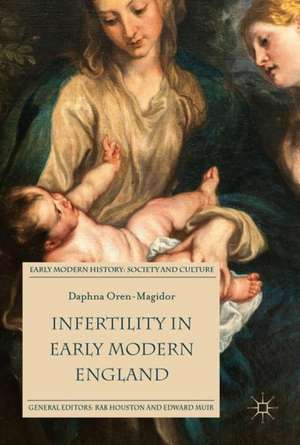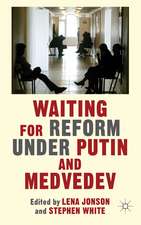Infertility in Early Modern England: Early Modern History: Society and Culture
Autor Daphna Oren-Magidoren Limba Engleză Hardback – 29 aug 2017
Din seria Early Modern History: Society and Culture
-
 Preț: 340.61 lei
Preț: 340.61 lei -
 Preț: 221.08 lei
Preț: 221.08 lei - 15%
 Preț: 640.37 lei
Preț: 640.37 lei -
 Preț: 393.52 lei
Preț: 393.52 lei - 15%
 Preț: 644.49 lei
Preț: 644.49 lei -
 Preț: 391.61 lei
Preț: 391.61 lei - 15%
 Preț: 589.65 lei
Preț: 589.65 lei - 15%
 Preț: 645.60 lei
Preț: 645.60 lei -
 Preț: 389.11 lei
Preț: 389.11 lei - 15%
 Preț: 641.71 lei
Preț: 641.71 lei - 18%
 Preț: 724.63 lei
Preț: 724.63 lei - 18%
 Preț: 1221.21 lei
Preț: 1221.21 lei - 18%
 Preț: 1057.17 lei
Preț: 1057.17 lei - 15%
 Preț: 643.99 lei
Preț: 643.99 lei - 15%
 Preț: 588.83 lei
Preț: 588.83 lei -
 Preț: 330.65 lei
Preț: 330.65 lei -
 Preț: 405.48 lei
Preț: 405.48 lei - 15%
 Preț: 641.53 lei
Preț: 641.53 lei -
 Preț: 382.75 lei
Preț: 382.75 lei - 8%
 Preț: 536.21 lei
Preț: 536.21 lei - 15%
 Preț: 699.77 lei
Preț: 699.77 lei - 18%
 Preț: 780.82 lei
Preț: 780.82 lei - 15%
 Preț: 699.77 lei
Preț: 699.77 lei -
 Preț: 392.60 lei
Preț: 392.60 lei - 15%
 Preț: 640.06 lei
Preț: 640.06 lei - 15%
 Preț: 640.88 lei
Preț: 640.88 lei - 15%
 Preț: 642.68 lei
Preț: 642.68 lei - 15%
 Preț: 640.55 lei
Preț: 640.55 lei - 15%
 Preț: 635.01 lei
Preț: 635.01 lei -
 Preț: 386.00 lei
Preț: 386.00 lei
Preț: 729.53 lei
Preț vechi: 889.68 lei
-18% Nou
Puncte Express: 1094
Preț estimativ în valută:
139.59€ • 146.16$ • 115.78£
139.59€ • 146.16$ • 115.78£
Carte tipărită la comandă
Livrare economică 09-23 aprilie
Preluare comenzi: 021 569.72.76
Specificații
ISBN-13: 9781137476678
ISBN-10: 1137476672
Pagini: 288
Ilustrații: XV, 196 p. 5 illus. in color.
Dimensiuni: 148 x 210 x 18 mm
Greutate: 0.5 kg
Ediția:2017
Editura: Palgrave Macmillan UK
Colecția Palgrave Macmillan
Seria Early Modern History: Society and Culture
Locul publicării:London, United Kingdom
ISBN-10: 1137476672
Pagini: 288
Ilustrații: XV, 196 p. 5 illus. in color.
Dimensiuni: 148 x 210 x 18 mm
Greutate: 0.5 kg
Ediția:2017
Editura: Palgrave Macmillan UK
Colecția Palgrave Macmillan
Seria Early Modern History: Society and Culture
Locul publicării:London, United Kingdom
Cuprins
Chapter 1: Introduction.- Chapter 2: Experiencing Infertility.- Chapter 3: Explaining Infertility.- Chapter 4: Infertility and Society.- Chapter 5: Treating Infertility.- Chapter 6: Conclusion.- Bibliography.- Index
Recenzii
“Oren-Magidor’s book offers fascinating insights into the experiences of couples who yearned to have children. … This is an important social and cultural history of infertility. It shows how the religious ideas about the causes of infertility had negative consequences for attitudes towards childless men and women. The argument that religious and medical ideas acted in tandem is convincing … .” (Elizabeth Foyster, Bulletin of the History of Medicine, Vol. 93 (1), 2019)
“Infertility in Early Modern England explores the ways in which religion, medicine and gender interacted to define the experiences of childlessness for both men and women and holds that the presence of widespread negative attitudes surrounding infertility reflected contemporary fears of an upended social order. … Infertility in Early Modern England convincingly establishes that infertility deserves more thoughtful treatment than it currently receives from scholars, and this book is an important step in that direction.” (Erin Johnson, Origins, origins.osu.edu, April 17, 2019)
“Infertility in Early Modern England explores the ways in which religion, medicine and gender interacted to define the experiences of childlessness for both men and women and holds that the presence of widespread negative attitudes surrounding infertility reflected contemporary fears of an upended social order. … Infertility in Early Modern England convincingly establishes that infertility deserves more thoughtful treatment than it currently receives from scholars, and this book is an important step in that direction.” (Erin Johnson, Origins, origins.osu.edu, April 17, 2019)
“Oren-Magidor’s most important contribution may be that infertility upset the social order as much as sexual transgression or illegitimacy. … This study also illuminates the extent to which medicine and religion were intertwined in early modern society. … Oren-Magidor has produced a finely crafted study that provides a much needed re-centering of infertility and the struggles men and women confronted in order to have children in discussions of early modern reproductive practices.” (Jennifer F. Kosmin, Journal of the History of Medicine and Allied Sciences, Vol. 73 (3), July, 2018)
“Oren-Magidor has collected information from a wide range of sources which together provide a well-balanced picture of the impact of infertility in early modern society. … Infertility in Early Modern England is engaging and well written; it contains much interesting and useful detail and it will provide worthwhile reading for all students of early modern social history.” (Chris Galley, Local Population Studies, Issue 100, 2018)
Notă biografică
Daphna Oren-Magidor is Postdoctoral Fellow at the Martin Buber Society of Fellows at the Hebrew University of Jerusalem, Israel, where she is working on the histories of gender, sexuality, medicine and the family in Early Modern England.
Textul de pe ultima copertă
This book explores the experiences of people who struggled with fertility problems in sixteenth and seventeenth-century England. Motherhood was central to early modern women’s identity and was even seen as their path to salvation. To a lesser extent, fatherhood played an important role in constructing proper masculinity. When childbearing failed this was seen not only as a medical problem but as a personal emotional crisis. Infertility in Early Modern England highlights the experiences of early modern infertile couples: their desire for children, the social stigmas they faced, and the ways that social structures and religious beliefs gave meaning to infertility. It also describes the methods of treating fertility problems, from home-remedies to water cures. Offering a multi-faceted view, the book demonstrates the centrality of religion to every aspect of early modern infertility, from understanding to treatment. It also highlights the ways in which infertility unsettled the social order by placing into question the gendered categories of femininity and masculinity.
Caracteristici
Assesses the experiences of people with fertility issues in sixteenth and seventeenth-century England Demonstrates the centrality of religion to understanding of infertility in Early Modern England Exposes the challenges that infertility posed to gender and social norms














